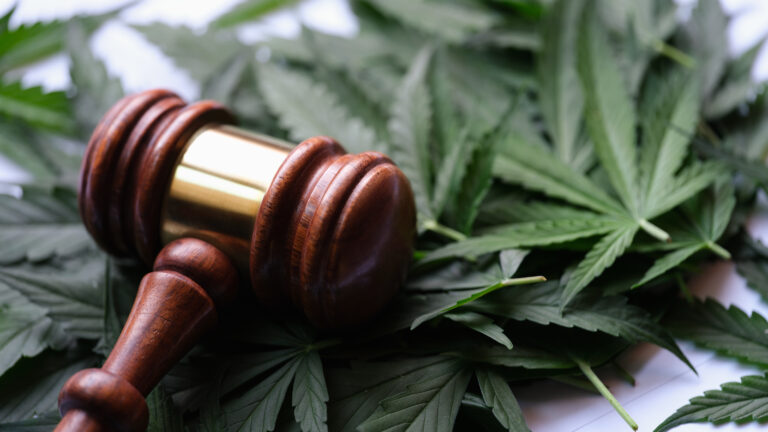
The Green Light: US Government Announces Landmark Marijuana Legalization
The US government recently made a significant announcement regarding the legalization of marijuana. This decision marks a major shift in the country’s stance on the controversial plant and has sparked a mix of reactions from politicians, advocates, and citizens alike.
On April 20th, 2021, Senate Majority Leader Chuck Schumer, along with Senators Cory Booker and Ron Wyden, announced their plans to introduce legislation to decriminalize and regulate marijuana at the federal level. This bold move comes after years of mounting pressure from advocates and states that have already legalized marijuana for medical and recreational use.
The proposed legislation, known as the Cannabis Administration and Opportunity Act, aims to remove marijuana from the list of controlled substances, expunge non-violent marijuana-related criminal records, and create a pathway for states to legalize marijuana without fear of federal interference. Additionally, the bill seeks to address social equity concerns by reinvesting tax revenue from marijuana sales into communities disproportionately affected by the war on drugs.
This announcement comes at a time when public support for marijuana legalization is at an all-time high. According to a recent Gallup poll, 68% of Americans support legalizing marijuana, with an overwhelming majority of Democrats and Independents in favor of the move. This bipartisan support reflects a growing recognition of the potential benefits of marijuana legalization, both in terms of economic growth and social justice.
Proponents of the legislation argue that marijuana legalization will create new opportunities for small businesses, generate tax revenue for state and local governments, and reduce the burden on the criminal justice system. They also point to the racial disparities in marijuana enforcement, with Black and Latino individuals disproportionately targeted for marijuana-related offenses.
However, not everyone is on board with the government’s decision to legalize marijuana. Critics argue that marijuana is a dangerous substance that can lead to addiction, impaired driving, and other negative health effects. They also express concerns about the potential impact on youth and vulnerable populations, who may be more susceptible to the harms of marijuana use.
Despite these concerns, the momentum for marijuana legalization appears to be growing. With more than half of U.S. states already allowing some form of marijuana use, the federal government’s announcement signals a significant shift in policy that could have far-reaching implications for the country as a whole.
As the debate over marijuana legalization continues to unfold, it is clear that the issue is far from settled. However, the government’s recent announcement represents a major step forward in the push for marijuana reform and underscores the need for a more nuanced and comprehensive approach to drug policy in the United States. The recent announcement from the United States federal government regarding the decriminalization and regulation of marijuana has sparked discussions and speculations about how this decision may impact individual states, including Pennsylvania, which has been considering recreational legalization.
Pennsylvania has already taken steps toward marijuana reform by legalizing medical marijuana in 2016. This move has been well-received and has provided relief to numerous patients suffering from various medical conditions. However, recreational use of marijuana in Pennsylvania remains illegal, and the state has yet to fully embrace the idea of legalization. With the federal government’s push for marijuana reform, Pennsylvania may find itself in a better position to seriously consider recreational legalization. The new legislation proposed by Senate Majority Leader Chuck Schumer and others could provide an impetus for lawmakers in Pennsylvania to further explore the potential benefits of legalizing recreational marijuana.
One possible effect of the federal government’s decision is that it could alleviate concerns about federal interference. Currently, states that have legalized marijuana for recreational use operate in a legal gray area due to conflicting state and federal laws. The federal government’s new legislation could provide reassurance to Pennsylvania lawmakers that they can move forward with recreational legalization without fear of federal intervention.
Additionally, the proposed legislation includes provisions for social equity and reinvestment in communities affected by the war on drugs. This aspect could resonate with Pennsylvania lawmakers who have been advocating for criminal justice reform and addressing the racial disparities in drug enforcement. However, it is important to note that the final decision on recreational legalization in Pennsylvania ultimately lies with state lawmakers. While the federal government’s new marijuana legislation may provide some guidance and support, it does not automatically guarantee that Pennsylvania will legalize recreational use.
As the discussions on marijuana reform continue, Pennsylvania will need to carefully consider the potential benefits and drawbacks of recreational legalization. It will be essential for lawmakers to consult with experts, study the experiences of other states that have legalized recreational use, and listen to the concerns and opinions of their constituents before making a final decision. Pennsylvania, like many other states in the United States, has been grappling with the question of whether to legalize marijuana for recreational use. While the state has already taken steps toward marijuana reform by legalizing medical marijuana in 2016, the issue of recreational legalization remains a hotly debated topic. Currently, recreational use of marijuana is illegal in Pennsylvania. However, there have been ongoing discussions and efforts to change this. In recent years, several bills have been introduced in the Pennsylvania General Assembly to legalize recreational marijuana, but none have gained enough traction to become law.
One of the main challenges to legalizing recreational marijuana in Pennsylvania has been the political landscape. Despite growing public support for legalization, there is still some resistance among lawmakers, particularly in the Republican-controlled legislature. Opponents of legalization argue that marijuana is a gateway drug and can have negative impacts on public health and safety. However, there are signs that the tide may be turning. In 2019, Lieutenant Governor John Fetterman embarked on a statewide listening tour to gather public input on the issue of recreational marijuana. The tour revealed that a majority of Pennsylvanians support legalization, with many citing potential economic benefits and the need for criminal justice reform.
Moreover, neighboring states have taken steps towards legalization. New Jersey legalized recreational marijuana in 2021, and this has put pressure on Pennsylvania to consider the potential economic advantages of legalization. Advocates argue that legalizing marijuana could create jobs, generate tax revenue, and stimulate economic growth in the state.
Further, the COVID-19 pandemic has further highlighted the need for revenue streams to support economic recovery. Many supporters of legalization believe that the tax revenue from marijuana sales could provide a much-needed boost to Pennsylvania’s economy, especially as the state faces budget deficits. Despite these factors, the road to recreational legalization in Pennsylvania remains uncertain. The current political climate, coupled with ongoing concerns about public health and safety, makes it difficult to predict when or if legalization will occur. In the meantime, Pennsylvania continues to expand its medical marijuana program, which has been successful in providing relief to patients suffering from various medical conditions. The state has also decriminalized small amounts of marijuana, leading to a reduction in low-level marijuana arrests.
As the debate over marijuana legalization continues in Pennsylvania, it is crucial for lawmakers to thoroughly examine the potential benefits and drawbacks. They should consider the experiences of other states that have legalized recreational use, consult with experts, and listen to the concerns and opinions of their constituents. Ultimately, the decision on recreational marijuana legalization in Pennsylvania will require careful deliberation and a balancing of various interests and perspectives.
The Kendall PC team has been following national and local marijuana legislative efforts since 2012. Give our team a call today to learn how we can help you and/or your cannabis business.



